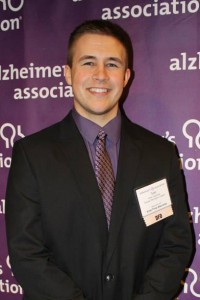Getting nervous before a class presentation is a normal part of college but imagine the amount of butterflies and countless forgetting-to-show-up-wearing-pants nightmares before speaking in front of 500 people, including senators in Washington, D.C.
NMU junior social work major Tyler Leightner experienced this amount of pressure to be the voice of Alzheimer’s disease.

After countless plane troubles, Leightner delivered his speech, which was the main attraction of the day dedicated to speaking to legislators about Alzheimer’s, Monday, March 23 in Washington, D.C.
Leightner said no one in the crowd of hundreds had ever attended the Washington, D.C. Alzheimer’s event before.
“I feel something needs to be done because it’s not happening right now,” Leightner said. “It was really interesting to talk to the senators—me being 21—to tell them how I felt, what I know, and what they need to do.”
Alzheimer’s is a type of dementia that causes problems with memory, thinking and behavior. This progressive disease makes people lose the ability to carry on a conversation and respond to their environment. It is the sixth leading cause of death in the U.S. and the only one out of the top 10 that cannot be prevented, cured or slowed, according to the Alzheimer’s Association.
Leightner said the forum this year was the largest it’s ever been reaching—up to 1,100 people.
“Cancer had a fear behind it for many years. Now people support it,” Leightner said. “Alzheimer’s is basically the final frontier. Nobody wants to divulge in the brain and talk about the brain to discover new things. I don’t know why that is when we think about the brain and we think about mental health we start deterring from that. We fear it, I guess.”
The NMU student’s passion for the disease isn’t just sparked by his social work major but also by his 45-year-old mother’s diagnosis of early-onset Alzheimer’s.
NMU alumna Ashleigh Rogers went with Leightner to Washington, D.C. Rogers is his support system, Leightner said. Rogers said Leightner’s speech came from the heart.
“The experience was phenomenal,” Rogers said. “I don’t have Alzheimer’s in my family. I didn’t really know about the disease until I met Tyler almost three years ago. So going to D.C., I really learned a lot about the disease and the lack of knowledge and support worldwide.”
Early-onset Alzheimer’s affects people younger than 65. An estimate of only 200,000 people have this form of the disease, according to the Alzheimer’s Association.
Leightner said he didn’t hold back from talking about his mother in his speech to help show an example of how the disease affects various lives.
“It’s very personal when you talk about your mother,” Leightner said. “I talked a little bit about myself but more toward my mother and how she’s dealing with it. The implications of the other things around her affect her.”
NMU students can help raise awareness about the disease here in the U.P.
This past fall, the Walk to End Alzheimer’s was held at the YMCA. The town raised $2,780.28 for the cause with five teams consisting of six walkers each.
At the event, Leightner met the director of the Marquette Alzheimer’s Association with the help of professor Patricia Cianciolo. The director later invited Leightner to speak in Washington, D.C.
This was a great example of how one connection can change a person’s life, Cianciolo said.
NMU already has a campus Relay for Life but Leightner suggested that adding an event for Alzheimers would be a good addition.
Cianciolo said Leightner taking this on himself as an advocacy issue is commendable to be willing to share personal experience for the betterment of people.
“I think it took enormous courage and I admire him for that,” Cianciolo said. “He was willing to really open up some very personal issues in his own family and recognize that his vulnerability was something that would be an important tool to educate other people about the scope of the disease. Why we need research, why we need dollars available not only for research but for programs to help people with the disease and their caretakers.”
Leightner said getting people to speak up about the disease is his main goal.
“I want to be a voice for this whole disease,” Leightner said. “It’s the elephant in the room nobody talks about, but you know it’s there. I don’t stop thinking about it. It’s on my mind all day, every day. I always think about how I can do more.”
























